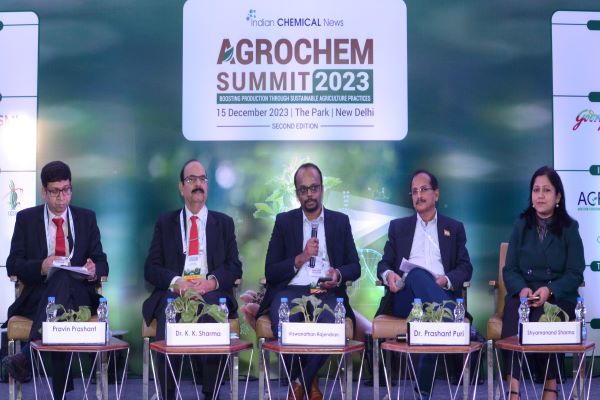Precision agriculture, balanced use of agrochemicals, and farmer education are interconnected aspects that play a crucial role in efficient farming

The triad of precision agriculture, balanced use of agrochemicals, and farmers' education is not merely a confluence of practices but a philosophy that beckons us towards a sustainable future. This approach allows farmers to tailor their practices based on specific conditions, leading to increased efficiency and reduced waste.
The leading agrochemical industry experts discussed the farming trends at the third session, ‘Precision Agriculture, Balanced use of Agrochemicals, and Farmers Education’ of AgroChem Summit 2023 organized by the Indian Chemical News in New Delhi on December 15, 2023. The session was moderated by Viswanathan Rajendran, Partner, Kearney.
Dr. K. K. Sharma, Consultant, Pesticide Residues, Risk Assessment & Regulatory Affairs stressed on the balanced use of agrochemicals involving applying fertilizers, pesticides, and herbicides judiciously to maximize crop yields while minimizing negative environmental effects.
“In spite of using the pesticides, we are still losing our crops. About two million thousand tonnes of agricultural produce gets damaged because of various insects and pests. While pesticides play an important role for plant protection, since these are toxic and poisonous, they should be used judiciously and scientifically. So once the buyer figures out data generated on a particular pesticide used for a particular crop to control a particular insect and pest, it is basically good agriculture practice. Once the bio efficacy data is generated, then we we have to consider the JDA value of that particular pesticide, the residue left at the time of harvest and the food factor which we are consuming for these risk assessments. Once the maximum residue level (MRL) is performed then it is recommended to the farmers. And suppose that particular commodity is moving in international trade. What if we violate our own MRL, then it can be easily rejected by the importing country? Suppose our Indian MRL is .2 PPM and the importing country's MRL is 1 PPM, they are able to reject it because we are not following our GPs. So our GPs and MRL should be respected to overcome the trade barriers that will help save the environment and safeguard consumer safety."
Calling for science based and data driven pesticide application, Dr. Prashant Puri, Head - R&D, Deepak Fertilizers & Petrochemicals Corporation Ltd. (DFPCL) said, “Today most of the fertilizers are generic and we blame the farmers for using urea which is subsidized. I think somewhere we scientists are wrong, but we have not propagated that you need to have precision to get higher yields. An overdose of everything impacts the farmers, soil, health and his future earning for his future generation. It is only recently that we are seeing that. Talking about soil health, fertilizers are impacting the bacterial presence in the soil and therefore, over the years, the soil is becoming dusty. The delivery is based on control and specific release of a nutrient at a given rate at which the plant requires during germination and fruitification. We really don't know how much of it is actually required and how much of it is wasted? This is the cause of overdose of pesticides impacting human health and often our exports are rejected. We should learn from Israeli model that has converted the desert into productive farms because of precision delivery of nutrients.”
Sharing his future outlook, Viswanathan Rajendran, Partner, Kearney said: “When we look forward to the rest of the decade and beyond, agriculture is going to be faced with the residue issue, the precise nutrient issue, the soil health issue, climate and sustainability issue. Since over usage of chemicals and nutrients leads to sustainability problems and the water shortage issue, the only way for India to sustain and for the world is to become more precise. The European Union already stated its ambition of reducing chemical usage by about 50% within this decade. That might not be feasible, but they are on the path to reduce. We will see similar ecosystem moves across the agriculture spectrum from technology players, fertilizer players and farmers to more precisely use the resources and inputs that we have for the Indian industry, it's cognitive to be at the cutting edge of this development.”
The AgroChem Summit 2023 themed, ‘Boosting Production Through Sustainable Agriculture Practices’, witnessed attendance by stalwarts and other stakeholders from the agrochemical sector across India.
The Summit was supported by the Department of Chemicals and Petrochemicals, Ministry of Chemicals and Fertilizers, Government of India.
Gold partners of the summit were Godrej Agrovet Ltd., SML Ltd., and Somaiya Vidyavihar University.
Industry association supporting AgroChem Summit 2023 included Agro Chem Federation of India (ACFI); Crop Care Federation of India (CCFI); Crop Life India (CLI); Pesticides Manufacturers & Formulators Association of India (PFFAI); and Biological Agri Solutions Association of India (BASAI).
Subscribe to our newsletter & stay updated.